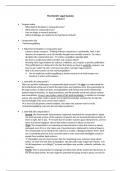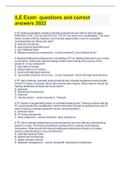The World’s Legal Systems
Lecture 1:
Program today
- What kind of discipline is comparative law?
- What aims for comparative law?
- How to design a research question?
Which challenges are related to the functional method?
Comparative law
= Rechtsvergelijking
1. What kind of dicipline is comparative law?
- Lawyers always compare: ‘Thinking without comparison is unthinkable. And, in the
absence of comparison, so is all scientific thought and scientific research. ‘So, why a
discipline like comparative law.’ Juristen vergelijken eigenlijk altijd.
- But how to understand other societies and compare them?
- Knowing other legal systems (or cultures, traditions, etc.) requies a specific justification
- This justification is to befound in the fact that when we have to explicitiy compare, you
have to get ‘under the skin’ of at least one other (‘strange’) legal systems
- Wat is de meerwaarde van het rechtsvergelijken?
Om tot expliciete rechtsvergelijking te komen moet je in de huid kruipen van
minstens 1 ander rechtssysteem.
1. John Bell (UK comparatist) I
There are peculiar challeneges in comparative legal research. The first is to understand the
full institutional setting out of which the legal issues and solutions arise: the organisation of
the legal system, its legal concepts, presuppotitions and mental map of the relationships
between legal institutions, its legal procedures, and the broader social and cultural context
and assumptions. In one’s own system, much of this tacit knowledge. In relation to a foreign
system, the researcher needs to aquire more explicit knowledge, and also has to mke the
tacit knowlegde of his own system more explicit.’
Je moet dus de gehele context bekijken, niet alleen het systeem van het recht.
Rechtsvergelijking is dus iets dat niet alleen juridisch is
1. John Bell (UK comparatist) II
- Second: the hermeneutic (interpreteren) approach requiered the comparatist to adopt
the internal point of view of the systems compared, but not necessarily believe either of
them is right, fair or just. Je moet dus het andere systeem gaan interpreteren, om het
beter te kunnen begrijpen. Hoe zit het andere systeem in elkaar en waarom?
- Third: The comparatist is not reporting an internal point of view that comes as clearly
packaged, even if he or she makes use of questionnaires addressed to national lawyers.
The comparatist has to interpret the systems to enable a dialogue between them. Each
law is something that has to be reconstructed in order to provide intelligible results to
people from another legal systems.
- Vergelijken zou iets meer kunnen zijn dan simpelweg twee systemen langs elkaar
zetten. Je moet het echt leren te begrijpen. Het zijn ander type vragen dan slechts; ‘is in
NL dit toegestaan, en in België?’ Je moet ook kijken naar sociale, culturele, politieke, etc.
aspecten.
- Fourth: there is presentation in language and ideas that will be understood by lawyers in
the home legal system. At each stage the potential foe going wrong is great, not least in
, the institutional and interpretative features. However, that is why there is strength in the
rigour of comparative research.’
Als je de systemen wil begrijpen in het licht van elkaar moet je een taal gaan
gebruiken die daarboven ligt. Je moet hiervoor een bruikbaar begrippenkader vinden die
bruikbaar is in beide systemen. Welke taal gebruik je dan dus?
John Bell stelt dus 4 problemen aan de kaart die komen kijken bij rechtsvergelijking.
2. What are the purposes of doing comparative law?
- Het verwerven van kennis + het zet je vooronderstellingen in perspectief
1. Theoretical:
Acquiring knowledge: ‘He who knows one society, knows no society.’
Putting your own presuppositions in perspective: comparative law as a mirror
2. Practical
For judges, legislators, policy makers, etc.
3. Functionalism as a major research tool
- Zolang je een goede vraag formuleert, is rechtsvergelijking mogelijk (vb. je kan appels en
peren wel met elkaar vergelijken).
- Functionalisme: heeft 2 Duitse grondleggers = TT
Zweigert and Kötz: ‘The basic methodological principle of all comparative law.’
Zweigert and Kötz: ‘From this basic principle stem all the other rules which
determine the choice of laws to compare, the scope of the undertaking, the creation
of a system of comparative law, and so on.’
- Gaziadei: ‘One of the best-known working tools is comparative legal studies’
- Glendon: ‘The functional approach, now recognized to have wide applicability, was
probably comparative law’s principal gift to twentieth century legal science.’
What purpose does this method have (according to Zweigert and Kötz)?
- Objectiviteit bereiken in de rechtswetenschap
a. A tool for framing a ‘neutral’ research question (and come to ‘scientific exacititude
and objectivity’)?
b. A tool for finding a so-called tertium comparationis
Framing a research question
- ‘The problem (to be researched) must be stated without any reference to the concepts
of one’s own legal systems.’ Hier zit in een streven naar neutraliteit in
- The local legal solutions ‘must be freed from the context of its own system … cut loose
from their conceptual context and stripped of their national doctrinal overtones, so that
they may be seen purely in the light of their function, as an attempt to satisfy a particular
legal need.’ Je moet allereerst afstand nemen van de regels. Je moet denken vanuit
een probleem want de regels zijn functioneel voor het oplossen van maatschappelijke
problemen.
The lawyer as an ‘architect’! Van de samenleving. Recht is bedoeld om problemen op te
lossen.
Je moet daarom eerst het maatschappelijke probleem omschrijven;
Translation into research question:
- Voorbeeld uit het contractenrecht om het probleem te omschrijven;
Thus instead of asking, ‘What formal requirements are there for sales contracts in foreign
law?’ It is better to as, ‘How does foreign law protect parties from suprise, or from being held
to an agreement not seriously intended?’
Van een hele formele vraagstelling, naar een veel bredere vraagstelling.
, - Tweede vraag is eigenlijk ook problematisch vanwege
Translation into research question II – 2 quotes
- Iedere samenleving heeft dezelfde problemen, het resultaat van de oplossingen is altijd
ongeveer hetzelfde.
Universal societal problems (bv. armoede) different law (recht als oplossing voor
maatschappelijke problemen) stimilar solutions (de oplossingen lijken vaak op elkaar).
Lecture 2:
- Tekst van Husa niet leren = vervallen
Program today
1. How to design a research question?
Which challenges are related to the functional method?
2. What does a functional, scheme look like? The case of ‘regulating the end of life’
(including ‘casting the net wide’ tekst Adams-Griffiths)
3. In what language to report on a comparative project? (Tekst Adams)
Framing a research question
- ‘The problem (to be researched) must be stated without any reference to the concepts
of one’s own legal system.’
- The local legal solutions ‘must bef reed from the context of its own system … cut loose
from their conceptual context and stripped of their national doctrinal overtons, so that
they may bes een purely in the light of their function, as an attempt to satisfy a particular
legal need.’
The lawyer as an ‘architect’
Functionalism as a – very useful – heuristic device or search engine
- Example: Italian unemployment benefits
Er waren veel seizoenarbeiders in Italië. In Noord-Italië was er een bepaald fonds
voor die seizoenarbeiders, zodat zij kunnen overleven in de winter. In Zuid-Italië
moest je je als gehandicapt laten verklaren om een uitkering te krijgen om te kunnen
overleven. Dit moet je wel betrekken in een rechtsvergelijkend onderzoek. Je
moet dus echt kijken hoe het daadwerkelijk werkt in het land, i.p.v. alleen in de
boeken te kijken hoe het ‘systeem zou moeten werken’.
- As this example shows, functionalism wants, next to identify the relevant rules, also get
rid of comparative law that starts with too much of a focus on rules.
The comparatist ‘much eradicate the preconceptions of his native legal system.’
- Functionalisme is dus een soort ‘zoekmachine’ voor een rechtsvergelijking
Challenges of the functional method => tunnel vision (be aware!)
, - Een tunnelvisie hebben in een onderzoek is niet goed!
- ‘We find that as a general rule developed nations answer the needs of ‘legal business’ in
the same or in a very similar way. Indeed it amounts to a praesumptio similitudinus, a
presumption that the practical results are similar.’
- ‘If one’s comparative research seems to be leading to the conclusion that the foreign
system has nothing to report, one must rethink the original question and purge it of all
the dogmatic accretions of one’s own system.’
- ‘The researcher can rest content if his researches through all the relevant material lead
to the conclusion that the systems he has compared reach the same or similar practical
results, (else) he should go warned and go back to check again whether the terms in
which he posed his orginal research question were indeed purely functional…’
- ‘If the comparatist finds no functional equivalent in a foreign legal order, he should check
again whether the terms in which he posed his original question were indeed purely
functional, and whether he has spread the net of his researches quite wide enough.’
Als je niet aantreft wat je had verwacht aan te treffen, dan moet je terug naar je onderzoeksvraag.
Die was dan waarschijnlijk verkeerd. (Zweigert & Kötz)
What is a tertium comparationis?
- Tertium comparationis: (Latin for ‘the third (part) of the comparison’) is the quality that
two (or more) things which are being compared have in common. It is the point of
comparison which prompted the author of the comparison in question to liken someone
or something to someone or something else in the first place (WIKI)
- See the case of ‘regulating the end of life’ (tekst Adams-Griffiths)
- Onderzoek naar Euthanasie door docent.
Example of a tertium comparationis:
Varieties of end-of-life medical behavior (MBPSL)
- Rechtsvergelijkend schema
- Zo’n functioneel schema is heel erg handig voor een rechtsvergelijkend onderzoek
How to understand similar systems in their context? Casting the net wide!
- Als je wilt begrijpen hoe een situatie is in een bepaald land (bv. waarom die regels daar
zo werken) dan moet je het net wijd uitgooien.
- Example: what is ‘normal medical practice’? Denk aan euthanasie voorbeeld.
- (See also tekst Adams-Griffiths)
- Dus, als je iets echt wilt snappen -> dan moet je ook daadwerkelijk naar de
sociaaleconomische kant kijken.






